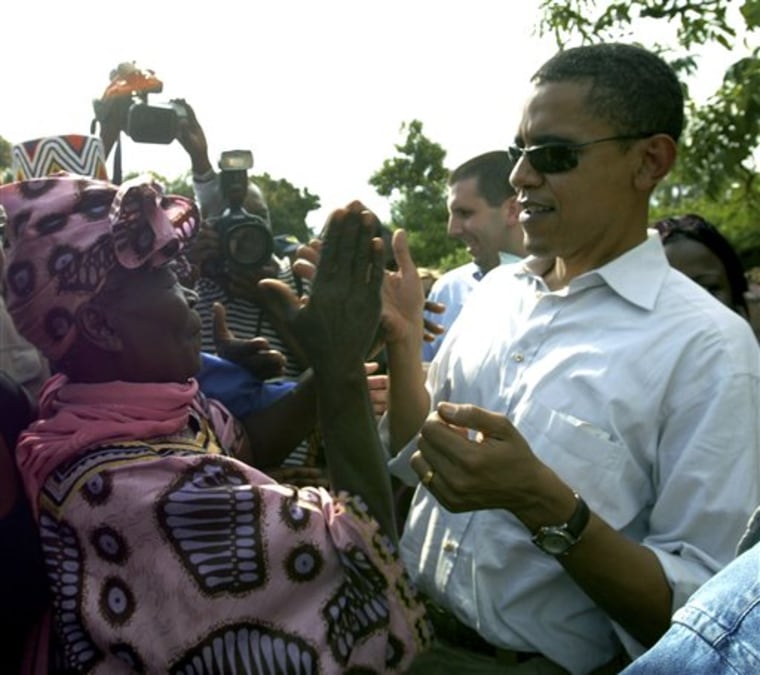Barack Obama's two years in the Senate have taken him around the world, from Russia to Iraq to Kenya - an itinerary more costly to taxpayers than any other senator who took office with him.
The Illinois Democrat's travels in 2005 and 2006 cost taxpayers nearly $28,000 as he studied nuclear proliferation, AIDS, Middle Eastern violence and more.
Eight other freshmen senators took office in 2005, and about $19,200 was the most anyone spent for government-paid travel, according to reports filed with the Senate Office of Public Records.
Obama's journeys are unusual for such a junior senator, but not for someone thinking of a presidential run someday.
"Valuable or not, it's the thing they all do to show that they're knowledgeable about the world," said Stephen Hess, a George Washington University professor and former presidential aide.
Obama, who announced his candidacy Saturday for the 2008 Democratic presidential nomination, was one of two freshmen members of the Senate Foreign Relations Committee in the 109th Congress. He spent $18,822 in per diem and transportation costs in 2006 as he visited Middle East hotspots and toured Africa. The previous year he spent $8,313 visiting the former Soviet Union and the United Kingdom.
The freshman with the next greatest spending on taxpayer-funded trips was Sen. Richard Burr, R-N.C., whose visits included China, Russia and the Middle East at a cost of about $19,200. Ranking third was freshman Sen. Tom Coburn, R-Okla., who spent $17,867 to visit China and Kuwait, among other places. Neither is a member of the Foreign Relations Committee.
However, other freshmen also took trips - both foreign and domestic - funded by private groups, which Obama does not accept. If Coburn's privately funded trips are included, his total travel amounts to nearly $29,000 for the two years, more than any other freshman.
Obama no match for more experienced collegues
Obama's travels were also eclipsed by some of the committee's more senior senators.
Sen. John Kerry, D-Mass., for instance, spent more than $61,000 on just taxpayer-subsidized trips during 2005-2006. Sen. Richard Lugar, the Indiana Republican who was then chairman of the committee, spent more than $94,000 in combined taxpayer- and privately funded trips.
Obama's staff issued a brief statement saying he's proud that his Russia trip led to an anti-proliferation law and that his Africa trip encouraged people to be tested for AIDS. Staff members also released a letter from Lugar praising Obama's personal diplomacy on the African trip.
Before he went to Africa, Obama told The Associated Press that the trip held "symbolic power" because he is the only black U.S. senator.
"What a trip like this does is it allows me to really target a wide range of issues that come up on the international stage and help Americans appreciate how much our fates are linked with the African continent," Obama said at the time.
Some additional costs
The official travel spending figures reported to the government don't include the cost of flights on military aircraft, which are often used on overseas trips by a congressional delegation. They also omit the staff time and security costs incurred by the U.S. embassies in the countries lawmakers visit.
Senators often bring along aides at additional expense to taxpayers. Obama took his foreign policy adviser and communications director to the former Soviet Union at a cost of $18,576. On the African trip, he took two aides, spending about $6,000 in campaign funds to offset the cost of one.
Obama's trips clearly aren't junkets and could educate him about important issues while strengthening his presidential resume, Hess said.
In Africa, Obama was often treated like royalty. Adoring crowds showed up wherever he went in Kenya, the home of his father.
Obama met several times with AIDS researchers and activists, and he and his wife publicly took an AIDS test to encourage Kenyans to do the same. He caused a stir by speaking out against corruption and the corrosive role of tribal loyalties in the Kenyan government. He also met with African presidents and activists, and traveled to remote villages, refugee camps and U.S. military posts.
And, Obama found time to take his family on a safari - something he did not bill to taxpayers.
When Obama went to the Middle East, he met with Israel's foreign minister, spent two days in Iraq talking to officials and military commanders, and made stops in the Palestinian territory, Jordan and Kuwait.
During his trip to the former Soviet Union, Obama joined Lugar in touring dilapidated weapons factories in Ukraine, watching workers destroy explosives and visiting the site where a nuclear missile was being dismantled.
